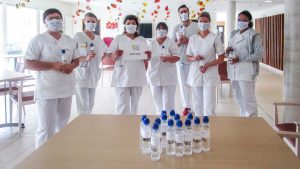
Sidel transforms French manufacturing site to make hand sanitizer bottles
Canadian Plastics
Packaging COVID-19The global packaging supplier has repurposed its international centre of excellence for PET packaging development and blowing solutions in Octeville-sur-Mer into a production centre to make bottles for hydro-alcoholic gel.

Photo Credit: Sidel
As part of its response to the COVID-19 pandemic, global packaging supplier Sidel has transformed its international centre of excellence for PET packaging development and blowing solutions in Octeville-sur-Mer, France into a production centre to make bottles for hydro-alcoholic gel.
According to an April 6 press release, the first batch of 5,000 PET plastic bottles for the disinfectant has already been provided to the Hospital of Dijon and an additional one has been distributed for Le Havre (Normandy) town’s pharmacies and hospitals.
“In France, just like anywhere else at the moment, there is a high demand for hydro-alcoholic gel for sanitization,” Sidel said. “Therefore, the French government issued a general plea for assistance as regards the production of the currently scarcely available product. Several industries as well as hospitals have responded to the call and are producing the gel. However, healthcare players are facing difficulties to distribute it to their employees as the gel is being produced in big size containers.”
“With collaborative skills and agile and creative work, our engaged employees were able to transform our centre of excellence into a small production centre in only two days,” said Vincent Le Guen, Sidel’s vice president of packaging. A first request was received from the Hospital of Dijon in the middle of March asking to provide small size containers in order to package the hydro-alcoholic gel, Le Guen continued, and Sidel responded quickly and found the right raw materials and cooperation partners to produce the bottles – these are made from an existing Sidel’s 500 ml mold and the preforms were provided by a key beverage player while the sport caps were supplied by a cap manufacturer. The sport closure allows controlling the gel flow and keeping it safe.
Within one week, the first 5,000 PET bottles have already been sent to the Hospital of Dijon, and in the meantime Sidel has started other similar initiatives. “We got in contact with a local deputy in Normandy and discussed how Sidel could support local health players in these challenging times,” Le Guen said. “The deputy informed us that also pharmacies are facing difficulties in gel distribution, therefore, in addition to the 500 ml bottle for hospitals, we quickly designed a smaller 200 ml bottle format, which is more user-friendly for individual use to be distributed in the local pharmacies.” In total, more than 1,000 bottles were delivered to the local pharmacies on April 1, Le Guen said – and all of them are 100 per cent recyclable and potentially refillable after sterilization.
Traditionally, the Sidel lab in Octeville-sur-Mer is a PET packaging development centre, and is not usually dedicated for industrial production. But these are not usual times. “Flexibility has long been a centrepiece of our solutions and services,” Le Guan said. “By working in this mode, our weekly production capacity is up to 20,000 bottles and we can handle more requests of this kind.”
